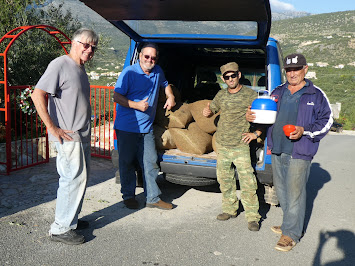Kalo Mina, we call out in greeting, Good (New) Month!
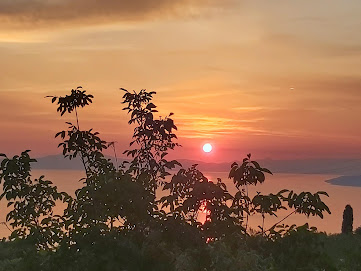 |
| A summer sunset in Greece |
July has arrived in Greece. The cicadas are filling the air with their surround-sound sizzling summer song. The sound they make reminds us of those huge oscillating irrigation sprinklers used to water thirsty fields in Washington State or the sound of electricity running through high voltage wires leading from the Columbia River on a hot summer's day.
The cicadas song is definitely the sound of summer in our slice of Greece but it also serves to remind us of the sounds we knew in our 'other world'. This is our fifth summer spent as American expats living in the rural part of the Peloponnese; transplants from the U.S. Pacific Northwest.
 |
| Stoupa Beach - summertime! |
Temperatures in Greece are soaring - with the thermometer climbing to 90F /32C. Humidity is just under 70%. This is the type of weather that gets us up early so that outdoor olive grove and garden chores are completed by mid-morning, and errands are completed before noon.
Afternoons - at least for locals - are spent indoors trying to stay cool. Tourists on foot, bike and in rental cars, head to the beaches to bake themselves into various shades of red and brown.
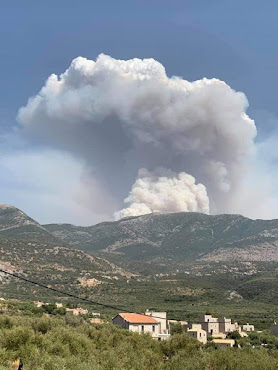 |
| Last summer's fire got a bit close to us |
Sadly, summer has become a time of wild fires, warnings and alerts have been coming fast and furiously in recent days. Now, reports of fires. They remind us via social media that the level of heat and a brisk breeze is a dire combination. Greece has taken a proactive approach to firefighting this summer. Firefighters from neighboring European Union countries have already arrived in Greece and are stationed throughout the country on the ready to fight any outbreaks that happen over the weekend.
Summer's Mid-Day Nap
With the heat and humidity climbing and our ambition correspondingly dropping, summer here is a time to perfect the mid-day nap. This Greek equivalent of a siesta usually takes place between 2 pm and 5 pm.
 |
| The Summer Nap - our cats love it! |
Called 'these ores ths laikis isikhias' in Greek, its literal translation is, 'the hours of popular quiet'. It is taken so seriously that police can cite those who violate the quiet. It is a time for a mid-day meal, rest and quiet. Prompted by the intense heat, often times the mid-day meal is eaten as late as 4 p.m. and the nap times can extend to 6:30pm.
Laborers stop work and resume in the cooler evening hours. Many retail outlets close during nap hours, opening in the evening and staying open as late as 11 p.m. or midnight. Restaurant diners don't arrive for meals until 8 p.m. or later.
The Summer After Covid
 |
| We have a fine dining restaurant in the village now |
I will admit we worried about a number of our friends and their businesses as the year-long Covid lock-down pretty much stretched into a two year lockdown, but I am happy to report that not only have all of our retail stores and restaurants in this part of the Mani re-opened, but we have also added new businesses to the line up as well.
 |
| Medikon opens in Ag. Nikolaos. Photo: Medikon |
In our village of Agios Nikolaos, we've had a fine dining/cocktail lounge open at the harbor in place of a long-time traditional Greek eatery. While we miss that menu and the folks who ran that place, the new restaurant has ratcheted up our dining options. I might add, it is also run by a couple from Athens whose family is here and run a traditional beach taverna just down the road.
 |
| Gelato in Agios Dimitrios |
And in Agios Dimitrios, the small hamlet literally at the foot of 'our' hill, a cafe has opened. This is BIG news as it is the only eatery or retail business in the village! A mom-and-two-daughter team from Kalamata has quickly turned it into a popular drink and snack destination.
Laid Back Locals
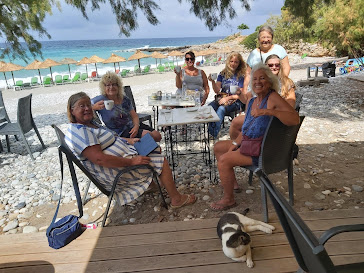 |
| An early morning coffee klatch on the beach! |
We were officially called 'locals' this week when a village businessman we often see having coffee at the same places we go to, labeled us as such. He said because we see each other enough to recognize each other - and he was born and raised here - then, we are considered, locals. So being 'locals' our summer mornings are spent as locals do -having a coffee at one of the many tavernas and cafes in the village. A group of lady friends met for coffee a few weeks ago and you can tell from the photo we are locals: as we are hovering in the shade and there so early the tourists haven't taken over the beach chairs in the background.
Although 'meeting for coffee and conversation' here is much like anywhere, we expats always take a moment to marvel at our surroundings. 'Can you believe we are meeting for coffee on a beach, walking distance from home and can run our feet through the sand while visiting?' one of us will invariably ask of the other.
Summer Travels
 |
| Tourists, 'selfies' and Athens sights from our hotel |
.png) |
| TravelnWrite is on the Gold List! |




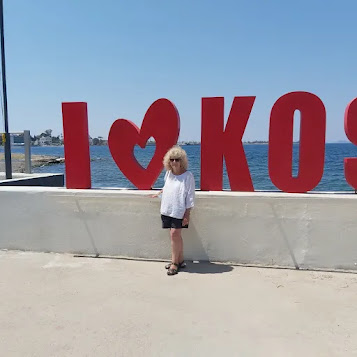






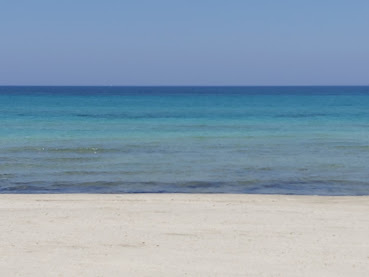




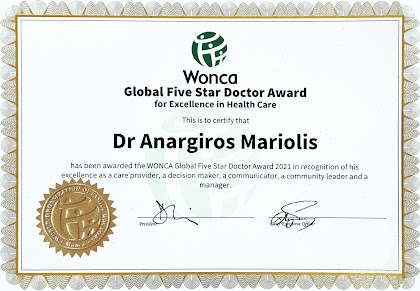







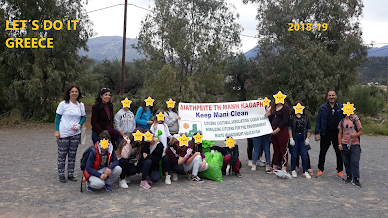





.png)







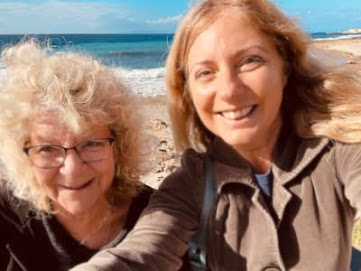
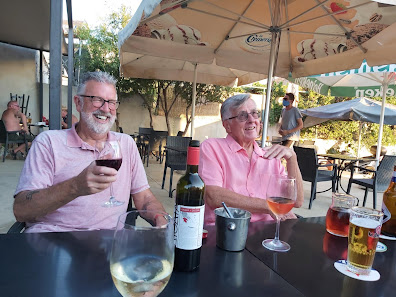
.JPG)



